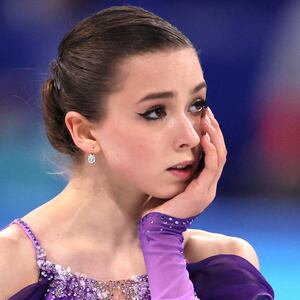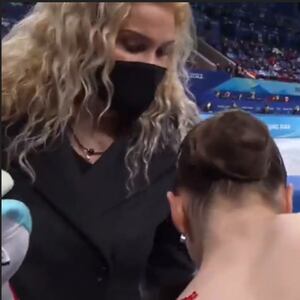This is a preview of our pop culture newsletter The Daily Beast’s Obsessed, written by senior entertainment reporter Kevin Fallon. To receive the full newsletter in your inbox each week, sign up for it here.
Listen, I’ve seen the Rocky movies. I know what we’re supposed to think about Russian athletes. But this is all too much; the disgraced and devastated 15-year-old figure skater Kamila Valieva is no Ivan Drago.
There’s been nothing remotely pleasant or entertaining—and plenty that’s been grotesque, perhaps even exploitative and irresponsible—about Valieva’s saga during these Olympics. That unfortunate story concluded for U.S. audiences during Thursday evening’s NBC primetime coverage, with a fallout and debasement that bordered on a snuff film of emotional torture more than it did a broadcast of spectacular sports drama.
Her story and her scandal, the way she’s been treated by the vulturous media and her arguably abusive coach, and the debate that surrounded it all just about electrocuted the legitimacy of figure skating at the Olympic level—which just about every current and former skater and skating expert confirmed this week. And in the wake of that shock: a death knell for the already struggling relevancy and popularity of not just the ice-bound competition, but the Olympic Games in general.
Whether you’re a once-every-four-years Olympics cheerleader or an in-the-weeds figure skating obsessive, you hated every second of it. In a year of Olympics coverage dominated by the question, “Do people care about the Olympics anymore?,” this, in all its ugliness, is not what anyone involved in the Games and how they’re broadcast wants as the dominating conversation piece.
I’m not sure how to breeze through a summary of what happened to make me, a person who has already forgotten the teams from Sunday’s Super Bowl, suddenly ascend the pulpit to preach about the fire and brimstone awaiting the world of sports. But I am a) a TV critic and b) gay, so I do know a lot about what makes for valuable versus unsavory event television, and what it means to think about nothing else but some teenagers spinning on ice skates for two weeks every four years.
The shortest recap is that Russia’s Kamila Valieva made history when, during the team event, she became the first female figure skater to land a quadruple jump in Olympic competition. It was the kind of feat that, no matter what patriotic allegiance you have for your home country athletes, you were awed by what a person as young as she had just accomplished. But I had barely come down from the high of…well, her heights, when the bombshell news detonated that she had tested positive for a banned substance and was put on temporary probation.
The logistics and details of the whole ordeal were a mess. Everything from what the drug was to whether or not she knew she was taking it and, most egregiously, when the test took place—back in December!—muddied what should have been a clear-cut decision: You dope, you’re done. Just ask Sha’Carri Richardson, the track and field star who was told exactly that when she tested positive for marijuana just before last year’s Tokyo Olympics.
While shielding Valieva with empathy, there was a volcanic eruption of outrage when it was ruled that she could compete in this week’s individual women’s competition, where she was favored to win gold. It was unfair to the clean athletes. It put an asterisk on this year’s Games. It exhibited favoritism, corruption, and double standards—and maybe even excused doping in the future. The sport had been spoiled, perhaps irreparably.
“I am so angry,” tweeted former Olympian Adam Rippon, who coached American skater Mariah Bell at this year’s Games. “Fuck this,” he added. “This entire situation is heartbreaking.” “What a shit show omg.”
For all the discourse and debate the decision ignited, there was something eerie and unusual when Valieva took the ice for her short program debut at the beginning of the week. NBC broadcast announcers Tara Lipinski and Johnny Weir, who typically gab as if auditioning for a Christopher Guest film, were basically silent. As she finished, Lipinski didn’t mince words: “She had a positive test. We should not have seen this skate.”
Nobody wanted to see this. It’s not good television, which is a fatal issue when you’re a network banking on interest and celebration in this being some of the most profitable television you’ll air in four years.
And there was certainly more than silence when Valieva, who finished her short program in first place, fought for the gold during the free skate on Thursday.
It was a disaster. She fell multiple times. Each mistake seemed to chip at her conviction and composure. There were tears. There was embarrassment. This wasn’t schadenfreude for a Russian athlete caught doping. This was raw-nerve pain; deep, deep sadness and a broken spirit from a teenager who, understandably, collapsed under the immense weight of a global scandal she may not even have been aware she was going to set off.
But then came the screaming. It came from her coach, Eteri Tutberidze, who berated her. “Explain it to me,” Tutberidze said. “You let it go completely. I don’t get it. Everything was fine.” It was cruel. It felt like witnessing violence. Valieva’s countrymate, Alexandra Trusova, melted down in a tantrum after finishing in silver position for a skate she felt deserved gold: “I will never go on the ice again in my life! I hate this sport, I hate it! You can't do it this way! You can't do it this way! Everyone has a gold medal, but not me. You knew everything!”
Sports should spark outsized emotions. There are high stakes, and that should yield high drama. But there was nothing thrilling or remotely redeemable about any of this. It was a live look at a formerly beloved sport swallowing itself whole amid corruption scandal. First, the doping. Now, as Trusova was alluding to, unfair judging.
All of this happened just after dawn Eastern time. By the time most Americans signed on for work on Thursday, they could read news reports about what happened, assuming they didn’t rise with the roosters to stream the event live.
The “spoiler alert” of it all affects how you take the competition in when you can finally watch it later in the evening on NBC primetime, like I did. There are advantages to this, like the opportunity to read the kinds of deep dives into the judging that contextualizes what to look for when the telecast finally starts. (Here are some great pieces.) But knowing that we all likely knew the outcome, the way NBC cheekily teased it—as if it was some climactic and exciting reveal—bordered on insidious, and was certainly gross.
I don’t know how the sport bore itself into this unwatchable hole, or how it can get out. Remember when we were all beside ourselves marveling over Nathan Chen’s record-setting gold medal performance last week? That might as well have been in the ’90s, which is just as well, because that’s the Golden Age my brain is stuck in when I think about why I love this sport.
The likes of Kristi Yamaguchi, Brian Boitano, Surya Bonaly, Oksana Baiul, Scott Hamilton, and, of course, Nancy Kerrigan and Tanya Harding (I suppose scandal is intrinsic to skating) weren’t just stars every four years, but household names between Games. I remember my neighbors at the bus stop talking about Michelle Kwan like a Marvel superhero. Tara Lipinski’s golden moment is seared in my brain in the same file as major personal life events.
It’s such a beautiful, breathtakingly difficult sport to be invested in. These athletes are unbelievable. I had to take a break from writing this because I got so overwhelmed thinking about what it must mean for them to be at the Olympics and make themselves so proud after a lifetime of work that I had to go have a little cry. But for it to end like this, with this hideousness? It’s unfair.
It’s a dark mark not just on figure skating, but what the Olympic Games—not to mention its media coverage—has come to mean. And a mark like this could, and maybe should, be permanent.








